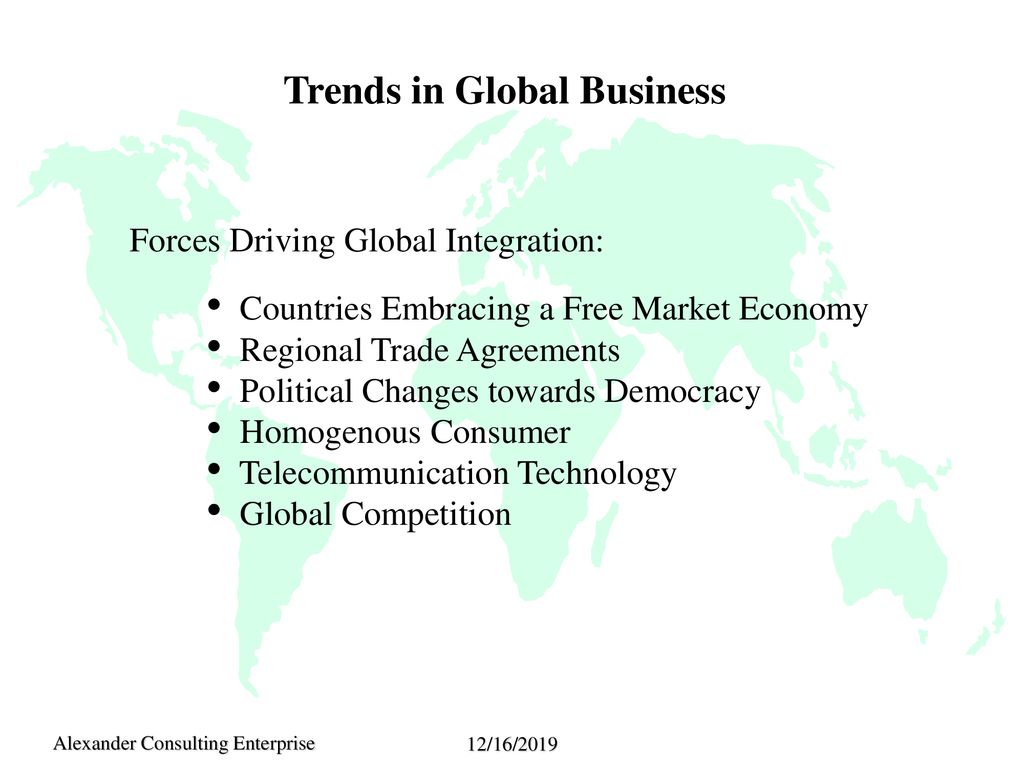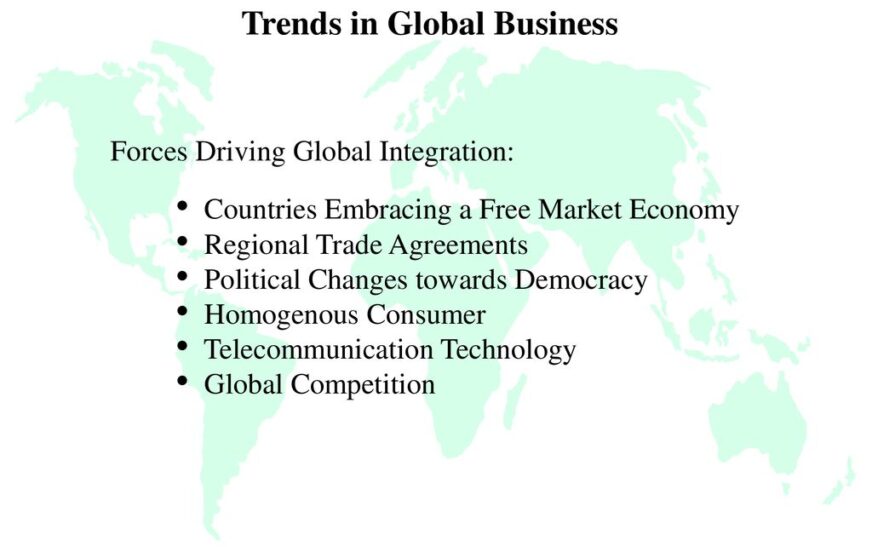Exploring the dynamic landscape of global business trends that shape the entrepreneurial world, this guide delves into key factors driving changes, the impact of technology disruption, and the growing importance of sustainability and corporate social responsibility.
From emerging markets to e-commerce transformations and cross-cultural communication, entrepreneurs are navigating a complex yet exciting realm of opportunities and challenges.
Overview of Global Business Trends
Global business trends are constantly evolving in response to various factors shaping the business landscape. The current global business environment is characterized by rapid technological advancements, changing consumer behavior, and geopolitical shifts. These factors are driving significant changes in how businesses operate and compete on a global scale.
Key Factors Driving Changes in Global Business Trends
- The Rise of Technology: Technological innovations such as artificial intelligence, big data analytics, and blockchain are revolutionizing business operations and creating new opportunities for growth.
- Changing Consumer Behavior: Shifts in consumer preferences towards sustainability, personalization, and convenience are reshaping the way companies engage with their customers.
- Geopolitical Uncertainty: Trade disputes, regulatory changes, and geopolitical tensions are impacting global supply chains and business operations, leading to increased uncertainty for businesses.
Impact of Globalization on Business Practices
- Increased Market Access: Globalization has opened up new markets for businesses to expand their reach and tap into diverse customer bases around the world.
- Supply Chain Optimization: Globalization has enabled businesses to optimize their supply chains by sourcing materials and components from different countries to reduce costs and improve efficiency.
- Cultural Diversity: Globalization has brought about a greater emphasis on cultural sensitivity and diversity in business practices, requiring companies to adapt and cater to a multicultural customer base.
Technology Disruption in Global Business

Technological advancements have significantly reshaped global business operations, leading to increased efficiency, productivity, and innovation across various industries.
The Role of Artificial Intelligence and Automation
Artificial intelligence (AI) and automation play a crucial role in streamlining processes, reducing human error, and enhancing decision-making in global industries. AI algorithms can analyze vast amounts of data to provide valuable insights, while automation technologies can perform repetitive tasks with precision and speed.
- AI-powered chatbots are transforming customer service by providing instant responses and personalized interactions.
- Automated supply chain systems are optimizing inventory management and logistics, leading to cost savings and improved delivery times.
- AI-driven predictive analytics are helping businesses forecast trends, identify risks, and make strategic decisions based on data-driven insights.
Innovative Technologies Revolutionizing Global Markets
Several innovative technologies are revolutionizing global markets, creating new opportunities for businesses to expand their reach and improve their competitive advantage.
- Blockchain technology is enhancing transparency and security in financial transactions, supply chain management, and digital identities.
- Internet of Things (IoT) devices are enabling real-time monitoring of equipment, assets, and processes, leading to predictive maintenance and operational efficiencies.
- Virtual and augmented reality technologies are transforming the customer experience by offering immersive and interactive solutions in retail, real estate, and entertainment industries.
Sustainability and Corporate Social Responsibility
In today's global business landscape, sustainability and corporate social responsibility (CSR) have become increasingly important factors for companies to consider. These concepts go beyond traditional profit-making goals and focus on the impact a business has on society and the environment.
Growing Importance of Sustainability
- Companies are realizing the long-term benefits of incorporating sustainable practices into their operations, such as cost savings through energy efficiency and waste reduction.
- Consumers are becoming more environmentally conscious and are actively seeking out businesses that prioritize sustainability, leading to a competitive advantage for companies that embrace these practices.
- Regulatory bodies are also placing greater emphasis on sustainability, with stricter environmental regulations pushing companies to adopt eco-friendly policies.
Impact of CSR Initiatives
- CSR initiatives can greatly enhance a company's reputation, leading to increased brand loyalty and positive consumer perception.
- Engaging in socially responsible activities can also attract top talent, as employees are increasingly looking to work for organizations that align with their values.
- From a financial perspective, companies that prioritize CSR tend to have higher employee productivity and lower turnover rates, ultimately contributing to a healthier bottom line.
Trends in Sustainable Business Models
- Many industries are shifting towards circular economy models, where resources are reused and recycled to minimize waste and maximize efficiency.
- Renewable energy sources are being embraced by businesses looking to reduce their carbon footprint and mitigate the effects of climate change.
- Supply chains are being reevaluated to ensure ethical sourcing practices and fair treatment of workers throughout the production process.
Emerging Markets and Opportunities
Entrepreneurs looking to expand their global business should consider key emerging markets that offer promising opportunities for growth and success.
Key Emerging Markets
- India: With a rapidly growing economy and a large consumer base, India offers immense potential for businesses across various industries.
- Brazil: The largest economy in South America, Brazil presents opportunities in sectors like agriculture, technology, and renewable energy.
- Nigeria: As one of the fastest-growing economies in Africa, Nigeria is attracting investments in telecommunications, fintech, and agriculture.
Challenges and Advantages of Entering New Markets
Entering new global markets comes with both challenges and advantages that entrepreneurs need to consider:
- Challenges:Cultural differences, legal regulations, market saturation, and competition are some of the obstacles businesses may face.
- Advantages:Access to new customer segments, lower production costs, and opportunities for innovation and growth are some of the benefits of expanding into emerging markets.
Strategies for Tapping into Emerging Market Opportunities
- Market Research: Conduct thorough market research to understand consumer needs, preferences, and competition in the target market.
- Local Partnerships: Forge partnerships with local businesses or experts to navigate cultural nuances and establish a strong presence in the market.
- Adaptation and Localization: Customize products, services, and marketing strategies to align with the specific requirements and preferences of the target market.
- Risk Management: Develop contingency plans and strategies to mitigate risks associated with political instability, currency fluctuations, or regulatory changes in the new market.
E-commerce and Digital Transformation
E-commerce has revolutionized the way businesses operate on a global scale, impacting trade dynamics and consumer behavior. With the increasing shift towards online shopping, businesses are leveraging digital transformation to stay competitive and drive growth.
Impact of E-commerce on Global Trade and Consumer Behavior
- E-commerce has expanded the reach of businesses, allowing them to tap into international markets without the need for physical storefronts.
- Consumers now have access to a wide range of products and services from around the world, leading to increased competition and price transparency.
- The convenience of online shopping has transformed consumer behavior, with more people opting for the ease of making purchases from their devices.
Businesses Leveraging Digital Transformation for Growth
- Companies are investing in digital technologies to enhance customer experiences, streamline operations, and gain valuable insights through data analytics.
- Adopting e-commerce platforms and digital marketing strategies have become essential for businesses to stay relevant and reach a wider audience.
- Automation and artificial intelligence are being utilized to optimize processes and improve efficiency in various aspects of e-commerce operations.
Trends in Online Retail and the Future of E-commerce
- Mobile commerce is on the rise, with more consumers shopping on their smartphones and tablets, driving the need for mobile-friendly websites and apps.
- Personalization and customization are key trends in online retail, as businesses strive to deliver tailored experiences to meet individual customer preferences.
- The integration of augmented reality and virtual reality technologies is shaping the future of e-commerce, offering immersive shopping experiences to consumers.
Cross-cultural Communication and Diversity
Cross-cultural communication plays a crucial role in global business interactions by bridging cultural gaps and fostering understanding among diverse teams. Embracing diversity in the workplace not only enhances innovation and problem-solving but also contributes to a more inclusive and dynamic organizational culture.
Benefits of Diversity in the Workplace
- Diverse perspectives lead to more creative solutions to complex problems.
- A diverse workforce can better understand and serve a global customer base.
- Inclusive environments promote employee satisfaction and retention.
Examples of Successful Cross-cultural Collaborations
- Toyota and General Motors partnership to develop fuel-efficient technology for hybrid cars.
- McDonald's localization of menus in different countries to cater to local tastes and preferences.
- Nestle's adaptation of products to suit cultural norms and dietary preferences in various markets.
Final Review

In conclusion, staying informed about global business trends is crucial for entrepreneurs looking to thrive in a competitive market. By adapting to technological advancements, embracing sustainability, and fostering diversity, entrepreneurs can position themselves for success in a rapidly evolving global economy.
FAQ Guide
What are some key factors driving changes in global business trends?
Factors include technological advancements, globalization, and shifting consumer behavior.
How can sustainability practices impact a company's reputation?
Implementing sustainable practices can enhance brand image, attract eco-conscious consumers, and improve stakeholder relationships.
What are some strategies for entrepreneurs to tap into emerging market opportunities?
Strategies include market research, understanding local cultures, forming partnerships, and adapting products/services to meet market demands.
Why is cross-cultural communication important in global business interactions?
Effective cross-cultural communication fosters understanding, builds trust, and enhances collaboration among diverse teams and partners.




